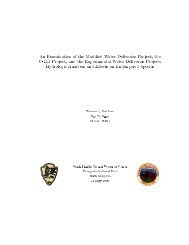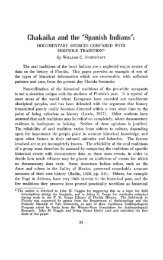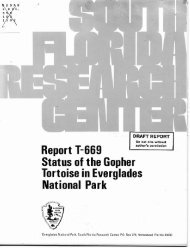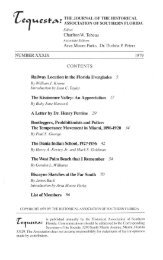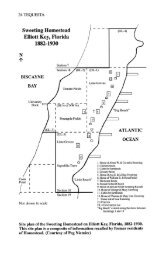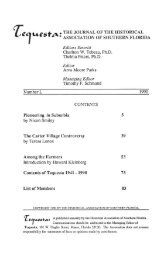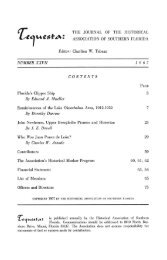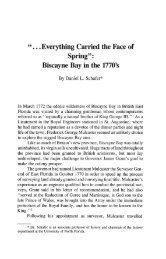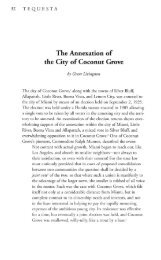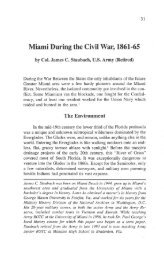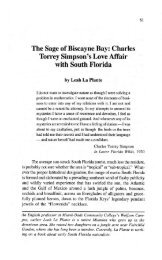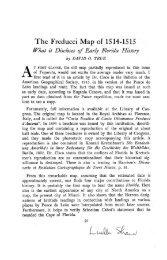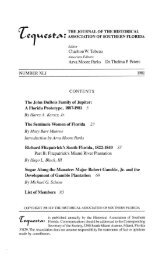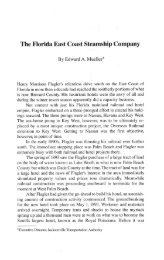Jacob Housman of Indian Key - FIU Digital Collections
Jacob Housman of Indian Key - FIU Digital Collections
Jacob Housman of Indian Key - FIU Digital Collections
Create successful ePaper yourself
Turn your PDF publications into a flip-book with our unique Google optimized e-Paper software.
<strong>Jacob</strong> <strong>Housman</strong> <strong>of</strong> <strong>Indian</strong> <strong>Key</strong><br />
By DOROTHY DODD<br />
In the early 1820's a young captain appeared on the Florida reef whose<br />
name was to become notorious in those parts. During some fifteen years in<br />
South Florida, <strong>Jacob</strong> <strong>Housman</strong> was known far and near as an enterprising,<br />
adventurous, and unscrupulous man-as a bold wrecker and the autocratic<br />
proprietor <strong>of</strong> <strong>Indian</strong> <strong>Key</strong>. The manner <strong>of</strong> his coming to Florida waters, if<br />
we may accept the account given by Ned Buntline,' was perfectly consonant<br />
with his later career.<br />
<strong>Housman</strong>, so the story runs, "was entrusted with the command <strong>of</strong> a small<br />
schooner at an early age, by his father, who owned the vessel. She was employed<br />
in the coasting and packet business along the shores <strong>of</strong> Staten and<br />
Long Islands, also up North River. The young Captain, however, was too<br />
much <strong>of</strong> a sailor to keep fresh water, and one day took it into his head to<br />
make a 'West Indie' trip without asking his father's permission, making said<br />
experiment in his father's vessel. The young Captain never reached his destination,<br />
for running <strong>of</strong>f his course he struck the Florida reef. This injured<br />
his little craft so much that he was obliged to put into <strong>Key</strong> West for repairs,<br />
during which time he got such an insight into the 'wrecking' business that he<br />
concluded to become a wrecker himself. His father having insisted upon<br />
considering <strong>Jacob</strong>'s elopement in the light <strong>of</strong> a theft, the Captain could not<br />
return to New York with safety, therefore this was the very business for him<br />
to take up." 2<br />
Ned Buntline apparently concurred with those who thought Florida<br />
wreckers to be little better than pirates or thieves. It is not too much to say<br />
that <strong>Housman</strong>, more than any other man, was responsible for the ill-repute<br />
in which the wrecking business was held. Arriving on the reef in the days<br />
before there was any effective regulation <strong>of</strong> wrecking, he continued to operate<br />
in a high-handed and <strong>of</strong>tentimes illegal manner even after the business was<br />
placed under the supervision <strong>of</strong> the Superior Court at <strong>Key</strong> West in 1828. 3<br />
The first notices we find <strong>of</strong> <strong>Housman</strong>'s activities as a wrecker appear in<br />
the fall <strong>of</strong> 1825, in connection with the French brig Revenge, although he<br />
had previously "been much engaged in the wrecking business."" The Revenge,<br />
3
4 TEQUESTA<br />
bound from Campeachy to France with cochineal and logwood, early in September<br />
went on the reef about three miles from Caesar's Creek. <strong>Housman</strong><br />
boarded her after she had bilged and been abandoned by her crew. On September<br />
7 he took <strong>of</strong>f in his schooner William Henry "eight Ceroons <strong>of</strong> cochineal,<br />
two boxes <strong>of</strong> Sugar, and a quantity <strong>of</strong> Logwood unknown, but supposed<br />
to be twelve tons, and a parcel <strong>of</strong> sails and rigging." 5<br />
Whether he decided to appropriate the salvaged goods without benefit<br />
<strong>of</strong> legal proceedings or clashed with the authorities at <strong>Key</strong> West over the<br />
adjudication <strong>of</strong> salvage is not clear. But on September 25, Fielding A.<br />
Browne, <strong>of</strong> <strong>Key</strong> West, charged him with "a most villainous act," namely with<br />
robbing the Revenge. It was the intention <strong>of</strong> <strong>Housman</strong>, who had "defied both<br />
the civil and military authorities <strong>of</strong> this place," Browne said, "to proceed to<br />
Charleston to dispose <strong>of</strong> his cargo." Browne therefore requested Captain<br />
Brown <strong>of</strong> the U. S. revenue cutter Florida, to pursue <strong>Housman</strong> and recover<br />
the French property. 6<br />
Whatever his intentions might have been, on September 27 <strong>Housman</strong><br />
brought the salvaged goods into St. Augustine. A week later he libeled the<br />
property under the territorial law <strong>of</strong> July 4, 1823, which provided for adjudication<br />
<strong>of</strong> salvage by a five-man jury. The St. Augustine jury allowed<br />
<strong>Housman</strong> 95 per cent. Considering the award excessive, the French consul<br />
at Charleston, who happened to be in St. Augustine, took the case into the<br />
Superior Court, where Judge Joseph L. Smith found the territorial law invalid.<br />
He did, however, award two-thirds salvage to <strong>Housman</strong>. 7<br />
In the meantime, Fielding A. Browne's letter charging <strong>Housman</strong> with<br />
theft had been widely published. Pointing to the Superior Court's decree as<br />
a vindication <strong>of</strong> his conduct, <strong>Housman</strong> branded the charge as libel. Then,<br />
as was to be his custom, he hit back at his opponent. He would, he said, "take<br />
another occasion to lay before the public, a history <strong>of</strong> the impartial and disinterested<br />
conduct <strong>of</strong> the gentlemen <strong>of</strong> many avocations at <strong>Key</strong> West, in their<br />
disposal <strong>of</strong> property falling under their control, and it will then be fairly<br />
understood whether there was more wisdom or folly in my giving preference<br />
to a decision at St. Augustine over one at <strong>Key</strong> West."8 From that day on, a<br />
dogged enmity underlay relations between <strong>Housman</strong> and the <strong>Key</strong> Westers.<br />
Three years later <strong>Housman</strong> was again in the news as the result <strong>of</strong> a collusive<br />
agreement with the captain <strong>of</strong> the French brig Vigilant. The Vigilant,<br />
which was carrying $32,000 in specie in addition to a regular cargo, went on<br />
shore near <strong>Key</strong> Vacas. She afterwards floated herself, but was surrounded<br />
by shoal water and accepted the services <strong>of</strong> two wreckers to pilot her into<br />
<strong>Key</strong> Vacas. After she was safely at anchor in a good harbor, <strong>Housman</strong> ar-
DOROTHY DODD 5<br />
rived in the wrecking sloop Sarah Isabella and agreed to pilot her to <strong>Key</strong><br />
West for 75 percent on the vessel, cargo, and specie, "with an understanding<br />
that <strong>Housman</strong> would return part <strong>of</strong> the money to the Captain, for Himself."<br />
Vessel and cargo were sold at <strong>Key</strong> West and the 75 percent duly paid to<br />
<strong>Housman</strong>. One <strong>of</strong> the real salvors <strong>of</strong> the Vigilant sued the Captain for $6,000<br />
salvage. The latter deposited that amount with an agent and sailed for<br />
Charleston with <strong>Housman</strong>. 9<br />
It was undoubtedly his wrecking pr<strong>of</strong>its that enabled <strong>Housman</strong> to develop<br />
<strong>Indian</strong> <strong>Key</strong>. This island, only eleven or twelve acres in area, not only possessed<br />
a good harbor for wreckers but was admirably situated for a wrecking<br />
rendezvous, lying as it does halfway between <strong>Key</strong> West and Cape Florida.<br />
<strong>Housman</strong> acquired it in 1825 from two squatters named Fletcher and Prince.<br />
who had settled there a year or two before.o 1 All accounts agree that he spent<br />
lavishly on the improvement <strong>of</strong> the key, transforming it, as one observer<br />
wrote, from a barren rock into "a miniature Eden." "It is, upon the whole,"<br />
remarked another, "a delightful residence, reminding me forcibly <strong>of</strong> the<br />
lines <strong>of</strong> Moore-<br />
"'Oh had we some bright little isle <strong>of</strong> our own,<br />
In a blue summer ocean far <strong>of</strong>f and alone.' "'I<br />
<strong>Housman</strong> neatly laid <strong>of</strong>f the island into streets and squares. He built<br />
himself "a large and elegant mansion," erected another large building for<br />
use as a hotel, and constructed a number <strong>of</strong> smaller houses for the families<br />
<strong>of</strong> his crews. He extended three substantial wharves out to the channels on<br />
the north and south <strong>of</strong> the key. He had several cisterns cut in solid rock to<br />
store rain water, and laboriously brought top soil from a distance to make<br />
3<br />
gardens in which subtropical fruits and flowers flourished.' By 1834 he was<br />
said to have spent nearly $40,000 on such improvements.'"<br />
In December, 1832, the Government stationed a customs inspector at<br />
<strong>Indian</strong> <strong>Key</strong>, Charles Howe being appointed to the post. 15 The harbor must<br />
have been quite a busy little port, for Howe reported 637 arrivals in 1834<br />
and 703 in 1835.16 On the other hand, the charge <strong>of</strong> <strong>Key</strong> Westers was probably<br />
true that "every little fishing boat, turtler, or wrecking vessel that stops<br />
there is noted as an arrival" in order to magnify the commerce <strong>of</strong> the place. 17<br />
In the spring <strong>of</strong> 1834 a post <strong>of</strong>fice was established with regular monthly<br />
mails from Charleston and New York. In an advertisement dated May 15,<br />
1834, Henry S. Waterhouse, postmaster, stated, "All letters and papers for<br />
persons residing on this island, at Cape Florida, Kayo-Biscayno, New River,<br />
<strong>Key</strong> Vacas, on board the lightship Florida, or on board any <strong>of</strong> the wrecking
6 TEQUESTA<br />
vessels, excepting the Pizarro, will reach their intended destination most<br />
8<br />
readily if mailed for this Office."'<br />
As this advertisement indicates, many wreckers used <strong>Indian</strong> <strong>Key</strong> as a<br />
headquarters where they procured provisions and ships stores and were in<br />
an advantageous position to hurry to wrecks occurring to the eastward. <strong>Housman</strong><br />
held a tight rein over his little island and exploited its advantages to<br />
the utmost. As his fortunes increased, he acquired three more wrecking vessels.<br />
His was the hotel which provided accommodations for transients and<br />
amusement for wreckers ashore in the form <strong>of</strong> billiards and nine pins. His,<br />
also, was the sole mercantile establishment, which grossed $30,000 a year<br />
from its trades with wreckers, settlers to the eastward, and <strong>Indian</strong>s <strong>of</strong> the<br />
Southern coast.<br />
"There are many poor persons, and some <strong>of</strong> them not noted for honesty,<br />
settled on the Florida <strong>Key</strong>s," wrote a visitor in 1833, "who are compelled to<br />
deal with this man. He, by allowing them credit and indulgence in his store,<br />
gains an ascendency which he turns to some account. These people are his<br />
agents, or spies . . . when occasion requires they are brought in as disinterested<br />
witnesses to prove a meritorious claim for salvage."' 1<br />
One such case, for which ample documentation exists, was that <strong>of</strong> the<br />
North Carolina, Captain George McIntyre, which left Apalachicola for<br />
Charleston March 9, 1833, laden with 336 bales <strong>of</strong> cotton. On the night <strong>of</strong><br />
March 14 she went ashore at low tide on Pickles Reef. The Hyder Alley,<br />
Joshua B. Smith, master, came up at daybreak to relieve her. Although<br />
neither took any part in the relief <strong>of</strong> the North Carolina, the Sarah Isabella,<br />
<strong>Housman</strong>, master, and the Brilliant, Austin Packer, master, were consorted<br />
with the Hyder Alley and would, according to the custom <strong>of</strong> the reef, automatically<br />
share in any salvage awarded the latter. The Hyder Alley took <strong>of</strong>f<br />
115 bales <strong>of</strong> the deck load to lighten the schooner. The North Carolina then<br />
floated <strong>of</strong>f the reef and accompanied the Hyder Alley into <strong>Indian</strong> <strong>Key</strong>.<br />
<strong>Housman</strong>, neglecting to inform McIntyre <strong>of</strong> his own financial interest in<br />
the salvage, persuaded the Captain to consign schooner and cargo to him<br />
as agent and to submit the salvage to arbitration instead <strong>of</strong> going to <strong>Key</strong><br />
West. Lemuel Otis and Charles M. Johnson, both residents <strong>of</strong> <strong>Indian</strong> <strong>Key</strong>,<br />
were named arbitrators. They appraised schooner and cargo at $8,940, valuing<br />
the cotton at $20 a bale although it had actually cost $36 in Apalachicola,<br />
and awarded 35 percent salvage. McIntyre paid the salvage <strong>of</strong> $3,129 with<br />
122 bales <strong>of</strong> cotton, $100 in cash, and a $600 draft on the owner <strong>of</strong> the<br />
cargo. In addition to his share <strong>of</strong> this salvage, <strong>Housman</strong> received the customary<br />
agent's commission <strong>of</strong> 5 percent, or $156.45, on the salvage.
DOROTHY DODD 7<br />
<strong>Housman</strong> apparently expected to reap additional pr<strong>of</strong>it by purchasing<br />
the other two salvors' share <strong>of</strong> the cotton at the low appraised price. When<br />
Oliver O'Hara, as agent <strong>of</strong> the consignees, on May 18 libeled the cotton taken<br />
from the North Carolina, <strong>Housman</strong> appeared as claimant. At that time he<br />
had only 72 bales in his warehouse, having sold 50 bales in Charleston at<br />
$50. Judge James Webb <strong>of</strong> the Superior Court at <strong>Key</strong> West decreed restitution<br />
<strong>of</strong> the 72 bales to the consignees on the grounds <strong>of</strong> a fraudulent agreement<br />
between <strong>Housman</strong> and McIntyre. Pending an appeal, <strong>Housman</strong> was<br />
permitted to keep the cotton at an agreed price <strong>of</strong> $33 a bale. In 1838 the<br />
Territorial Court <strong>of</strong> Appeals upheld Judge Webb's decision, whereupon<br />
<strong>Housman</strong> carried the case to the United States Supreme Court. Before that<br />
tribunal finally decided against him at the January term, 1841, his little<br />
kingdom had collapsed in ruins.20<br />
In 1836 <strong>Housman</strong> was found guilty <strong>of</strong> embezzling goods taken from the<br />
Ajax, the penalty being forfeiture <strong>of</strong> his share <strong>of</strong> the salvage. 21 In the fall<br />
<strong>of</strong> 1838, soon after the Court <strong>of</strong> Appeals had ruled against him -in the cases<br />
<strong>of</strong> the Ajax and North Carolina, Judge Webb revoked his license as a wrecker.<br />
The immediate occasion for this drastic penalty, according to Charles Nordh<strong>of</strong>f<br />
who was in <strong>Key</strong> West at the time, was the wreck on Carysfort Reef, "<strong>of</strong><br />
a large merchantman-large according to the standard <strong>of</strong> the times-with a<br />
full cargo <strong>of</strong> assorted merchandise." "It was charged," said Nordh<strong>of</strong>f, "that<br />
a certain wrecker had received from the wreck goods which he failed to deliver<br />
at <strong>Key</strong> West. Further, this wrecker had on his way stopped at his home at<br />
I. <strong>Key</strong>. The main fact having been proved, the wrecker was denied all salvage<br />
for his four vessels employed, and deprived also <strong>of</strong> his wrecking license."22<br />
In the meantime, the outbreak <strong>of</strong> the <strong>Indian</strong> war had greatly alarmed inhabitants<br />
<strong>of</strong> the south Florida coast. With characteristic energy, <strong>Housman</strong><br />
prepared for the defense <strong>of</strong> his island, which was expected to be attacked<br />
because <strong>of</strong> the large quantities <strong>of</strong> provisions and munitions in his store. On<br />
January 1, 1836, he procured the assent <strong>of</strong> all the able-bodied males, both<br />
white and slave, then at <strong>Indian</strong> <strong>Key</strong> to a "convention" which, declaring it to<br />
be "the duty <strong>of</strong> every man who enjoys the protection <strong>of</strong> Society to be prepared<br />
and willing to defend it," did "ordain determine and declare to raise such<br />
number <strong>of</strong> good Sober faithful men who are willing to enlist and Conform<br />
to the rules and regulations <strong>of</strong> the <strong>of</strong>ficers' under whose Command they may<br />
be placed." "It is therefore understood," the document concluded, "that those<br />
who Sign their names to this paper are inlisted and willing to obey the <strong>of</strong>ficers<br />
placed over them."23
8 TEQUESTA<br />
A week later, 24 men, including at least six slaves, enlisted for 40 days<br />
in Company B, 10th Florida Militia. <strong>Housman</strong> was elected captain and William<br />
H. Fletcher lieutenant. Others were later recruited, the greatest effective<br />
force <strong>of</strong> the company being 39 early in May. <strong>Housman</strong> advanced pay and<br />
subsistence at the regular army per diem <strong>of</strong> 30 cents for wages and 50 cents<br />
for rations. He also provided arms and powder for the recruits.<br />
By the end <strong>of</strong> January, embankments had been erected and a half dozen<br />
six- and twelve-pound cannon had been mounted at strategic points. 2 4 As a<br />
place <strong>of</strong> refuge for women and children, in the event <strong>of</strong> a successful attack,<br />
"a vessel, belonging to <strong>Housman</strong>, was prepared with portholes, a bulwark<br />
around the decks, and an armament, & moved a short distance from the<br />
Island."<br />
For the next eight months the inhabitants <strong>of</strong> <strong>Indian</strong> <strong>Key</strong> lived in daily<br />
terror <strong>of</strong> an attack, and with good cause. The little Island was crowded with<br />
refugees who had been driven from their homes at Cape Florida and on the<br />
eastern reef. Frequent reports were received <strong>of</strong> concentrations <strong>of</strong> <strong>Indian</strong>snow<br />
at New River, now at Cape Florida or Cape Sable. 2 5 "The <strong>Indian</strong>s were<br />
all around them-on the maine, on the neighboring Islands-ready with<br />
blanket sail canoes, to cross at any moment." There was scarcely a night but<br />
their fires could be seen from the island.<br />
But the only incident that occurred was on March 16, when a canoe with<br />
a lone Spaniard 26 in it, came to <strong>Indian</strong> <strong>Key</strong>, under the pretense <strong>of</strong> trading.<br />
Suspecting that he was a spy, the islanders "obliged him to tell that two<br />
<strong>Indian</strong>s came with him, and that he left them on an island about one mile<br />
distant. A boat was immediately dispatched with a number <strong>of</strong> men in search<br />
<strong>of</strong> them, and after some difficulty, they were found and brought to the<br />
island."27 The three "spies" were imprisoned at <strong>Indian</strong> <strong>Key</strong> until July, when<br />
they were turned over to the revenue cutter Dexter, from which they succeeded<br />
in escaping.<br />
In spite <strong>of</strong> the <strong>Indian</strong> war, <strong>Housman</strong> continued to develop and promote<br />
<strong>Indian</strong> <strong>Key</strong>. In 1837 and 1838 he employed James Dutcher, a marble cutter<br />
<strong>of</strong> New York City, to cut a large cistern out <strong>of</strong> solid rock at a cost <strong>of</strong> about<br />
$4,000. This and the smaller cisterns previously built, according to Dutcher,<br />
"furnished the only supplies <strong>of</strong> water for the inhabitants and the navy in the<br />
vicinity."28 In 1836 and 1837 Samuel A. Spencer assumed management <strong>of</strong><br />
the hotel and advertised <strong>Key</strong> West as "A Resort for Invalids" where there<br />
was "just sufficient business done . . . to amuse and not annoy invalids."z 2<br />
One person, at least, was attracted to the key as a health resort early in<br />
1837. Thomas Jefferson Smith is <strong>of</strong> interest primarily because his is the only
DOROTHY DODD 9<br />
favorable estimate <strong>of</strong> <strong>Housman</strong> that has been found. <strong>Housman</strong>, Smith wrote<br />
in 1846, "combined skill, bravery, coolness & discretion, with great personal<br />
strength to a pre-eminent degree." He was, moreover, "a man strictly <strong>of</strong> his<br />
word, correct in his deportment and honest in his dealings." The reader<br />
should be informed, however, that Smith was undoubtedly <strong>Housman</strong>'s "man,"<br />
having been for several years his "confidential and legal adviser and attorney."<br />
30 And like his master, he was not noted for honesty. 31<br />
More important than the continued physical development <strong>of</strong> the island<br />
were <strong>Housman</strong>'s efforts to make <strong>Indian</strong> <strong>Key</strong> independent <strong>of</strong> any control<br />
from <strong>Key</strong> West. A step that promised much in this direction was the establishment<br />
<strong>of</strong> Dade County on February 4, 1836, with <strong>Indian</strong> <strong>Key</strong> as the temporary<br />
county seat. 32 <strong>Housman</strong> probably was the leading spirit in this matter.<br />
Certainly his name headed the following petition, which resulted in the creation<br />
<strong>of</strong> the new county.<br />
"To the Legislative Council <strong>of</strong> the Territory <strong>of</strong> Florida<br />
"The memorial <strong>of</strong> the undersigned citizens <strong>of</strong> the County <strong>of</strong> Monroe in<br />
said Territory respectfully represents, that your memorialists reside in the<br />
northern section <strong>of</strong> said County, some <strong>of</strong> them Two hundred and thirty miles<br />
from the Court house, and none less than seventy five miles from it the whole<br />
<strong>of</strong> which distance they are obliged to travel by water in open boats in tempestuous<br />
weather during the fall and winter months. Your memorialists are<br />
not generally detained by public duty more than 6 days and some times not<br />
so much; but in bad weather they are frequently unable to reach their homes<br />
in less than three or four weeks, their Jury fees will not pay their board in<br />
<strong>Key</strong> West, and the whole <strong>of</strong> their expenses <strong>of</strong> boat hire and provisions are a<br />
dead loss to them, besides having to leave their families and domestic concerns<br />
at the times they are most required to be at home-your memorialists<br />
believe that no people in the U: States have ever been in a similar situation,<br />
and a cursory view <strong>of</strong> the map will be sufficient to convince your Honl body<br />
<strong>of</strong> the necessity <strong>of</strong> granting them relief. They therefore pray that the County<br />
be divided as follows. A line running from West end Bay Honda <strong>Key</strong>, to<br />
Cape Sable and from thence to Lake Macaco, and thence to the head <strong>of</strong> what<br />
is known now as Hillsboro River, (the north branch) and down said River<br />
to the Atlantic Ocean-Your memorialists would further represent that so<br />
long as Monroe County remains in the present state, that the public interest<br />
must <strong>of</strong> necessity be neglected and the ends <strong>of</strong> Justice be defeated, this has<br />
frequently been the case <strong>of</strong> late, and the reason is Witnesses and Jurors cannot<br />
find the means to transport themselves by Water to <strong>Key</strong> West to the Court
10 TEQUESTA<br />
House. Your petitioners will ever be found willing to perform all the public<br />
duties incumbent upon them as good citizens, but some <strong>of</strong> them are in circumstances<br />
which precludes the possibility <strong>of</strong> their attendance at <strong>Key</strong> West as<br />
witnesses or Jurors." 33<br />
Within the boundaries <strong>of</strong> the new county, which were those specified in<br />
the petition, the principal settlements were at <strong>Indian</strong> <strong>Key</strong>, Cape Florida, and<br />
<strong>Key</strong> Vacas. The possible claims <strong>of</strong> the latter two were tacitly recognized by<br />
leaving open the location <strong>of</strong> the permanent county seat. Until that should<br />
be effected, the judge <strong>of</strong> the Southern District was to hold one term <strong>of</strong> the<br />
Superior Court each year at <strong>Indian</strong> <strong>Key</strong> and the judge <strong>of</strong> the county court<br />
was to hold a term each at Cape Florida and <strong>Indian</strong> <strong>Key</strong>. The clerks <strong>of</strong> both<br />
courts were to keep their <strong>of</strong>fices and records at <strong>Indian</strong> <strong>Key</strong>. The provision<br />
for holding a term <strong>of</strong> the Superior Court there was annulled by an act <strong>of</strong><br />
Congress <strong>of</strong> July 2, 1836. 34 The next Legislative Council, however, calmly<br />
reestablished a Superior Court in Dade County. 3 5<br />
Partly because <strong>of</strong> unsettled conditions incident to the <strong>Indian</strong> war, Dade<br />
County soon became, for all practical purposes, <strong>Indian</strong> <strong>Key</strong>-the one being<br />
as much under <strong>Housman</strong>'s domination as the other. He took the most effective<br />
means <strong>of</strong> keeping the county seat at <strong>Indian</strong> <strong>Key</strong> by building a courthouse<br />
there "out <strong>of</strong> his own private funds." 36 Most <strong>of</strong> the principal county <strong>of</strong>ficers<br />
were also his employees. Thomas Jefferson Smith was the first county judge. 37<br />
George W. Somarindyck, <strong>Housman</strong>'s chief clerk for eight years, was the first<br />
clerk <strong>of</strong> the county court. 38 He was succeeded in that position in 1840 by<br />
Walter C. Maloney, also a clerk to <strong>Housman</strong>, who had previously served as<br />
clerk <strong>of</strong> the Superior Court. From 1840 to 1842 Maloney was clerk <strong>of</strong> the<br />
county court, a justice <strong>of</strong> the peace, and an auctioneer. James Dutcher, the<br />
New York marble cutter, was a justice <strong>of</strong> the peace during his stay on the<br />
island. And Lemuel Otis, one <strong>of</strong> the arbitrators who decided the salvage in<br />
the case <strong>of</strong> the North Carolina, was a justice <strong>of</strong> the peace from 1836 to 1842<br />
and was elected sheriff in 1840. 39<br />
After three years <strong>of</strong> <strong>Housman</strong>'s autocratic rule, inhabitants <strong>of</strong> <strong>Key</strong> Vacas,<br />
supported by residents <strong>of</strong> Monroe County, appealed to the Legislative Council<br />
to repeal the law establishing Dade County, or at least to repeal the laws establishing<br />
Superior and County Courts there. The petition was referred to a<br />
Select Committee <strong>of</strong> the Senate, under the chairmanship <strong>of</strong> William Marvin,<br />
then U. S. district attorney and soon to be judge <strong>of</strong> the Southern District.<br />
The chief plaint <strong>of</strong> the petitioners, as stated in the report <strong>of</strong> the Select<br />
Committee, was that before the division <strong>of</strong> Monroe County, "it was with<br />
great difficulty that <strong>of</strong>fenses could be punished on account <strong>of</strong> the paucity <strong>of</strong>
DOROTHY DODD 11<br />
jurors, and that since such division, Monroe county is in as bad a condition as<br />
before, and that in the county <strong>of</strong> Dade it is utterly impossible to obtain a legal<br />
grand and petit jury. The administration <strong>of</strong> justice ... is therefore rendered<br />
impossible in the county <strong>of</strong> Dade, and very much embarrased in the county<br />
<strong>of</strong> Monroe." The petitioners further averred "that on account <strong>of</strong> the want <strong>of</strong><br />
jurors in Dade county, and <strong>of</strong> the consequent perfect irresponsibility <strong>of</strong> its<br />
<strong>of</strong>ficers, and on account <strong>of</strong> the superior power which wealth and position<br />
always gives, all power both Executive and Judicial is exercised by one man,<br />
the proprietor <strong>of</strong> <strong>Indian</strong> <strong>Key</strong>."<br />
In support <strong>of</strong> the latter statement, the petitioners presented affidavits by<br />
William H. Eldridge and John Sicher. Eldridge testified "that while at <strong>Indian</strong><br />
<strong>Key</strong>, in the month <strong>of</strong> August last [i. e. 1838], he saw in the warehouses <strong>of</strong><br />
<strong>Jacob</strong> <strong>Housman</strong> two white men, <strong>of</strong> the sloop Brilliant, confined in stocks, by<br />
order <strong>of</strong> Capt. <strong>Housman</strong>, and that in the month <strong>of</strong> October, he also saw two<br />
other white men, belonging to the schooner Sylph, in like manner, and by<br />
the orders <strong>of</strong> the said <strong>Housman</strong>, confined in stocks, and that it is a general<br />
report that such practices are common with the said <strong>Housman</strong> at that place."<br />
To which Sicher added the details that the men from the Brilliant "had been<br />
in that situation three days and were only allowed biscuit and water and no<br />
bedding, or musquito bars, and were obliged to sleep in that situation."<br />
The Committee gave full credence to the allegations <strong>of</strong> petitioners and<br />
affiants. "Dade county has, according to the best information in possession<br />
<strong>of</strong> your committee," said the report, "about sixteen legal jurors, Monroe has<br />
about forty, the whole put together will hardly enable the court to punish<br />
<strong>of</strong>fences where the whole extent <strong>of</strong> peremptory challenge is allowed, but are<br />
sufficient to secure the punishment <strong>of</strong> <strong>of</strong>fences where the whole extent <strong>of</strong><br />
these peremptory challenges are not allowed."40 As to conditions at <strong>Indian</strong><br />
<strong>Key</strong>, the report said: "Mr <strong>Housman</strong> holds no <strong>of</strong>fice. 41 It is vain for these<br />
men to appeal to the laws for redress. The suit must be tried in the county<br />
<strong>of</strong> Dade, and there, there is no jury ... It is certainly unjust that that portion<br />
<strong>of</strong> the citizens <strong>of</strong> South Florida, who are endeavoring to support the laws and<br />
to lead a quiet and an honest life, should be made to suffer in their character<br />
and reputations by the wanton outrages <strong>of</strong> others."<br />
The Committee concluded, therefore, that the petitioners were entitled to<br />
relief. Since the existence <strong>of</strong> Dade County had been recently recognized by<br />
Congress, 42 it did not deem it advisable to abolish the county. But realizing<br />
that the existence <strong>of</strong> courts in Dade County, with their clerks and other <strong>of</strong>ficers<br />
to issue and execute process by which a man's property or person might be<br />
seized without any possibility <strong>of</strong> bringing the matter to a trial, might be used
12 TEQUESTA<br />
"to the very great oppression and injury <strong>of</strong> the petitioners," the Committee<br />
recommended that the jurisdictions <strong>of</strong> the County and Superior Courts <strong>of</strong><br />
Dade County be transferred to the similar courts in Monroe County. 43 A bill<br />
was reported for that purpose, which passed the Senate but was defeated in<br />
the House. 44<br />
Late in 1839, Maloney resigned as clerk <strong>of</strong> the Superior Court. The <strong>of</strong>fice<br />
was in the appointment <strong>of</strong> the judge, and Marvin, though it must have been<br />
a bitter pill, was constrained to ask <strong>Housman</strong> to recommend a successor, or<br />
to accept the position himself, as he knew <strong>of</strong> no one to appoint. On November<br />
21 <strong>Housman</strong> curtly replied:<br />
"I have received your letter <strong>of</strong> 11 inst and have made application to four<br />
Respectable and Competent Gentlemen Who have Refused to hold any <strong>of</strong>fice<br />
in your Gift<br />
"For myself, You should have known that any gift <strong>of</strong> yours would be<br />
promptly Refused."<br />
When the Superior Court met at <strong>Indian</strong> <strong>Key</strong> in December, with Judge<br />
Marvin presiding, a grand jury was empaneled which inquired into the imprisonment<br />
<strong>of</strong> the two seamen from the Sylph. Lemuel Otis testified that in<br />
his capacity as a justice <strong>of</strong> the peace he had committed the men on the sworn<br />
complaint <strong>of</strong> Samuel Sanderson, master <strong>of</strong> the schooner, who had charged<br />
them with mutinous conduct. The grand jury completely exonerated <strong>Housman</strong><br />
and branded the evidence before the Senate Committee as "false and malicious."<br />
The imprisonment <strong>of</strong> the seamen from the Brilliant was discreetly<br />
ignored.<br />
<strong>Housman</strong> enclosed copies <strong>of</strong> his correspondence with Marvin and the<br />
grand jury presentment in a memorial which he addresed to the 1840 Senate.<br />
The report <strong>of</strong> the previous year, he said, with its "very Serious slanders,"<br />
was "evidently malicious"-the work <strong>of</strong> Marvin, who "has long been my most<br />
bitter and powerful enemy." 45 The committee to whom the memorial was<br />
referred brushed it aside with the comment that its main object appeared to<br />
be the eradication <strong>of</strong> the "suposed injurious impressions" created by Marvin's<br />
report. 46<br />
Another way in which <strong>Housman</strong> sought to enhance the importance <strong>of</strong><br />
<strong>Indian</strong> <strong>Key</strong> was by having it made a port <strong>of</strong> entry. Other hands than his<br />
signed the memorials to Congress requesting this in 1838 and 1839, but the<br />
voice was undoubtedly that <strong>of</strong> <strong>Jacob</strong>. His object was to cut into <strong>Key</strong> West's<br />
monopoly <strong>of</strong> the salvage business, a monopoly due to the law that all property<br />
salvaged within the jurisdiction <strong>of</strong> the United States must be taken into<br />
an American port <strong>of</strong> entry. 47 In this he had the cooperation <strong>of</strong> Northern in-
DOROTHY DODD 13<br />
surance underwriters and merchants, who believed that competition would<br />
prevent "many gross frauds committed upon underwriters" at <strong>Key</strong> West.48<br />
Opposing the project were <strong>Key</strong> West merchants and masters <strong>of</strong> wrecking<br />
vessels at <strong>Key</strong> West and <strong>Key</strong> Vacas. 49 So many and so conflicting were the<br />
statements, that Congress dropped the whole matter.<br />
Among those who were active in behalf <strong>of</strong> a port <strong>of</strong> entry at <strong>Indian</strong> <strong>Key</strong><br />
was Dr. Henry Perrine. s o Perrine had been agitating the introduction <strong>of</strong><br />
tropical plants into Florida and seeking a grant <strong>of</strong> land for the purpose since<br />
1831. 5 1 He had first interested Captain John DuBose, keeper <strong>of</strong> the Cape<br />
Florida lighthouse, who had made experimental plantings as early as 1833.<br />
In 1836 Charles Howe set out some plants at <strong>Indian</strong> <strong>Key</strong>. In the summer <strong>of</strong><br />
1837 Perrine visited <strong>Indian</strong> <strong>Key</strong> and, with Howe's assistance, began a nursery<br />
"where upwards <strong>of</strong> 200 species and varieties [were] planted in boxes for<br />
removal to the main land, when the Seminole war [should] cease."5 2 Finally,<br />
in the summer <strong>of</strong> 1838, Congress granted to Perrine and his associates,<br />
Charles Howe and James Webb, a township <strong>of</strong> land to be located on the mainland.<br />
53 As the selection could not be made while the <strong>Indian</strong> war continued,<br />
Perrine decided to bring his family to <strong>Indian</strong> <strong>Key</strong>, where he could supervise<br />
his nursery.<br />
The Perrines occupied a large, new house belonging to Charles Howe,<br />
located near Howe's own residence somewhat apart from the rest <strong>of</strong> the settlement.<br />
Although <strong>Housman</strong> was married, Perrine's wife and daughters did<br />
not associate with Mrs. <strong>Housman</strong>. "We were shut out from all social life,"<br />
wrote Hester Perrine Walker many years later, "with the exception <strong>of</strong> the<br />
family <strong>of</strong> Mr. Howe." 5 4 Her statement lends credibility to Ned Buntline's<br />
story that though, "after building and settling up his island," <strong>Housman</strong> "made<br />
a voyage to Charleston, and returned with a beautiful bride," the law repudiated<br />
her after his death "in consequence <strong>of</strong> neither license, record, or<br />
matrimonial pro<strong>of</strong> <strong>of</strong> any kind being get-at-able." '5<br />
When Perrine landed at <strong>Indian</strong> <strong>Key</strong> on Christmas day, 1838, he found<br />
conditions somewhat different from those in the summer <strong>of</strong> 1837. Then the<br />
inhabitants <strong>of</strong> the island had still been under arms, although after August,<br />
1836, <strong>Housman</strong>'s militia company consisted <strong>of</strong> only 20 to 22 men, half <strong>of</strong><br />
whom were Negroes. The company was disbanded in March, 1838, when<br />
the revenue cutter Dexter was based on <strong>Indian</strong> <strong>Key</strong>. After the withdrawal<br />
<strong>of</strong> the Dexter a few months later, vessels <strong>of</strong> the Florida Squadron made <strong>Indian</strong><br />
<strong>Key</strong> their un<strong>of</strong>ficial headquarters. At the time <strong>of</strong> Perrine's arrival, the<br />
island was being used as a supply depot by Lieutenant John T. McLaughlin<br />
<strong>of</strong> the U. S. schooner Wave.
14 TEQUESTA<br />
In August, 1839, Commander Isaac Mayo, then commanding the Squadron,<br />
visited <strong>Indian</strong> <strong>Key</strong> in the U. S. Steamer Poinsett. "Considering the post<br />
<strong>of</strong> great importance, for should the <strong>Indian</strong>s capture it, they would be abundantly<br />
supplied with ammunition and arms, also a large supply <strong>of</strong> provisions,"<br />
Commander Mayo stationed there a gun barge and thirteen men<br />
under the command <strong>of</strong> a passed midshipman. Lieutenant McLaughlin succeeded<br />
Mayo as commander <strong>of</strong> the Squadron in December, 1839. He continued<br />
to use <strong>Indian</strong> <strong>Key</strong> as a depot until the spring <strong>of</strong> 1840, when he withdrew<br />
the garrison and established his depot at Tea Table <strong>Key</strong>, about a half<br />
mile away.<br />
With the drilling <strong>of</strong> sailors and marines, and the coming and going <strong>of</strong><br />
naval vessels, <strong>Indian</strong> <strong>Key</strong> must have appeared a busy place. But <strong>Housman</strong><br />
was not prospering. As a merchant he did a small business with the Squadron,<br />
56 but not nearly enough to compensate for the loss <strong>of</strong> his former trade<br />
with the <strong>Indian</strong>s and reef settlers. He must have sorely missed, too, the income<br />
from wrecking cut <strong>of</strong>f when his license was revoked in 1838. And his<br />
claim against the government for $14,418 for the maintenance <strong>of</strong> the militia<br />
company, although he had pressed it since 1836, was unpaid. 57 The<br />
upshot was that he mortgaged all his property on the island to John Lawton<br />
and S. Murray, <strong>of</strong> Charleston, for $16,000. 58 "It was thought before the invasion,"<br />
Howe wrote in November, 1840, "that he could not stand it more<br />
than a year or two longer." 59<br />
The embarrassed state <strong>of</strong> his finances may have prompted <strong>Housman</strong> to<br />
address two remarkable documents to Congress in 1840. The first was "a<br />
proposition . . . to the Governor and Legislative Council <strong>of</strong> Florida, and to<br />
the President and national Congress <strong>of</strong> the United States, to catch or kill all<br />
the <strong>Indian</strong>s <strong>of</strong> South Florida, for two hundred dollars each."6 0 The second<br />
was a request for authorization to form a settlement on the south coast <strong>of</strong><br />
Florida and for a grant <strong>of</strong> land "to said settlers with the rights to the people<br />
<strong>of</strong> said settlement <strong>of</strong> self-government within the circle <strong>of</strong> three miles radius<br />
from the centre there<strong>of</strong>, with an exemption from all control <strong>of</strong> all <strong>of</strong>ficers<br />
and all laws <strong>of</strong> the revenue, naval, and military department <strong>of</strong> the Government<br />
<strong>of</strong> the United States."61<br />
Any chance <strong>Housman</strong> may have had <strong>of</strong> rehabilitating his fortunes vanished<br />
overnight. Between two and three o'clock on the morning <strong>of</strong> August 7,<br />
1840, <strong>Indian</strong> <strong>Key</strong> was attacked and laid waste by a large band <strong>of</strong> <strong>Indian</strong>s<br />
who paddled the 30 miles from the mainland in canoes. It was thought that<br />
they were guided by the two <strong>Indian</strong>s imprisoned on the key in 1836, for<br />
though they approached from the north, they rounded the island to land at
DOROTHY DODD 15<br />
a most unlikely spot on the southeast side. As they were stealthily deploying<br />
their forces, James Glass, a carpenter in <strong>Housman</strong>'s employ who chanced to<br />
be wakeful, saw their canoes drawn up on the beach. The discovery by the<br />
<strong>Indian</strong>s <strong>of</strong> Glass and his neighbor, George F. Beiglet, hastening across the<br />
island to warn <strong>Housman</strong>, gave the signal for attack.<br />
The main objectives were <strong>Housman</strong>'s residence and store on the north<br />
side <strong>of</strong> the key. A number <strong>of</strong> <strong>Indian</strong>s rushed upon the former with "such<br />
fury that they soon burst open the doors and windows. Capt. H., the moment<br />
he awoke sprung for his guns, which were placed behind a door, but was met<br />
by them. He then rushed into another room, and jumped out <strong>of</strong> the window<br />
with his wife, and happened not to be discovered by the <strong>Indian</strong>s, who were<br />
then all over the house. They ran across his garden, jumped fences, and<br />
plunged into the water at the south end <strong>of</strong> the island. He then took his wife<br />
and swam around to his Boat Pond, and got out one <strong>of</strong> his boats without<br />
being discovered, and pulled over to Tea Table <strong>Key</strong>."62<br />
The garrison at Tea Table <strong>Key</strong> had been reduced the day before to a<br />
score <strong>of</strong> men, all but five <strong>of</strong> whom were on the sick list, by the departure <strong>of</strong><br />
the Wave on an exploring expedition into the Everglades. After some delay,<br />
Midshipman Francis K. Murray, in temporary command, succeeded in manning<br />
two barges, each <strong>of</strong> which was armed with a four-pound swivel gun.<br />
He set <strong>of</strong>f for <strong>Indian</strong> <strong>Key</strong> about 7 o'clock with the intention <strong>of</strong> landing. The<br />
little task force was met by heavy fire, the <strong>Indian</strong>s putting to good use one<br />
<strong>of</strong> the six-pounders <strong>Housman</strong> had mounted for the defense <strong>of</strong> the island.<br />
The barges returned the fire, but at the third discharge the swivels rebounded<br />
overboard and Murray was forced to return to Tea Table <strong>Key</strong>. Left in undisputed<br />
control <strong>of</strong> the island, the <strong>Indian</strong>s loaded their own canoes and some<br />
<strong>of</strong> the small boats in the place with supplies <strong>of</strong> every kind from <strong>Housman</strong>'s<br />
store, set fire to the buildings and wharves, and finally withdrew in the early<br />
afternoon. According to Lieutenant McLaughlin, they left in 34 boats, including<br />
those taken from the key. "In some <strong>of</strong> the boats, six, seven and eight<br />
people were counted; in none, less than four; so that the number could not<br />
have been short <strong>of</strong> one hundred and thirty-four persons." 63<br />
At the time <strong>of</strong> the attack there were 35 white persons and 10 or 12<br />
Negroes on the island. Six whites and a Negro child lost their lives. The<br />
white victims were Dr. Perrine, John Motte, master <strong>of</strong> the wrecking sloop<br />
<strong>Key</strong> West, his wife and two children, and James Sturdy, a boy who was<br />
scalded to death when the building over the cistern in which he was hiding<br />
burned. The others escaped by reaching boats or hidiiig in the cisterns and<br />
under wharves. Lemuel Otis, who was sleeping in <strong>Housman</strong>'s store, was
16 TEQUESTA<br />
wounded but managed to reach the south beach and float <strong>of</strong>f in one <strong>of</strong> the<br />
canoes.<br />
The destruction <strong>of</strong> property was almost complete. Only Charles Howe's<br />
residence escaped the conflagration. "The number <strong>of</strong> buildings consumed,"<br />
said the account in the Charleston Courier, "was 38, consisting <strong>of</strong> dwelling<br />
houses and kitchens, ware-houses, stores, shops &c., all <strong>of</strong> which belonging<br />
to the enterprising proprietor, Capt. <strong>Jacob</strong> <strong>Housman</strong>, with the exceptions <strong>of</strong><br />
Mr. Howe's [new house], and one dwelling house and kitchen, belonging to<br />
Wm. F. English, Esqr."<br />
"Capt. <strong>Housman</strong>'s loss can hardly be estimated,"64 the writer commented.<br />
"What must have been his feelings on his first coming to the island to behold<br />
the total ruin <strong>of</strong> his indefatigable labors <strong>of</strong> twelve years-not a house left<br />
to shelter himself and wife-his splendidly furnished dwelling laid in asheshis<br />
large warehouses and store, with every description <strong>of</strong> goods, all shared<br />
the general consummation-his charming garden, containing some <strong>of</strong> the<br />
most valuable vegetables and fruits <strong>of</strong> tropical countries, all burnt to the<br />
ground." 6 5<br />
<strong>Housman</strong> and his wife presumably sought shelter at <strong>Key</strong> West, but in<br />
September he returned to <strong>Indian</strong> <strong>Key</strong>.66 Henry Goodyear, a former clerk,<br />
urged him to open another store, but he decided against it. Toward the end<br />
<strong>of</strong> October, according to Charles Howe, he "cleared out for good-took everything<br />
he had left, to <strong>Key</strong> West ... to sell at Auction-his Negroes-Boatsvessels<br />
& I think I see his object, he is as usual very schemy, he is a good<br />
deal in debt . . ."67<br />
After selling the few belongings that remained to him, <strong>Housman</strong> seems<br />
to have obtained employment on a wrecking vessel. He was killed on May 1,<br />
1841, "while attempting to go on board a wrecked vessel in a heavy sea-way;<br />
being crushed between his boat and the side <strong>of</strong> the vessel." Thus, moralized<br />
Ned Buntline, having lost his ill-gotten property, he lost his own life, "leaving<br />
behind nothing <strong>of</strong> value, not even a good name."68<br />
<strong>Housman</strong>'s widow soon found consolation for her bereavement in remarriage.<br />
69 Before that happy event, however, she ordered a fine marble<br />
tombstone from the north. It was erected on the east side <strong>of</strong> the island where,<br />
presumably, <strong>Housman</strong> was buried. Though the stone is now shattered, the<br />
following inscription can still be deciphered:<br />
"Here lieth the body <strong>of</strong> Capt. <strong>Jacob</strong> <strong>Housman</strong>, formerly <strong>of</strong><br />
Staten Island, State <strong>of</strong> New York, Proprietor <strong>of</strong> this island, who
DOROTHY DODD 17<br />
died by accident May 1st, 1841, aged 41 years 11 months.<br />
To his friends he was sincere, to his enemies he was kind, to<br />
all men faithful.<br />
This monument is erected by his most disconsolate though affectionate<br />
wife, Elizabeth Ann <strong>Housman</strong>.<br />
Sic Transit Gloria Mundi."70<br />
NOTES<br />
I Ned Buntline was the pen name <strong>of</strong> E. Z. C. Judson, who in 1840 was an acting lieutenant<br />
on the U. S. schooner Otsego <strong>of</strong> the Florida Squadron commanded by Lieutenant<br />
John T. McLaughlin, which was based on Tea Table <strong>Key</strong>. (Fred E. Pond, Life and<br />
Adventures <strong>of</strong> "Ned Buntline" [New York, 1919], p. 24). He thus had opportunity<br />
to learn, if not the true story <strong>of</strong> <strong>Housman</strong>'s youth, at least the version current on<br />
the reef.<br />
2 E. Z. C. Judson, "Sketches <strong>of</strong> the Florida War-<strong>Indian</strong> <strong>Key</strong>-Its rise, progress and<br />
destruction," copied from Western Literary Journal and Monthly Review in Pensacola<br />
Gazette, March 29, 1845. I am indebted to Dr. A. J. Hanna for this reference.<br />
3 For a general discussion <strong>of</strong> the subject, see Dorothy Dodd, "The Wrecking Business<br />
on the Florida Reef, 1822-1860," Florida Historical Quarterly, XXII (April 1944),<br />
171-199.<br />
4 Pensacola Gazette, December 3, 1825.<br />
a East Florida Herald, October 4, 1825.<br />
6 Ibid., November 8, 1825.<br />
7 Ibid.<br />
* Ibid.<br />
* Pensacola Gazette, August 12, 1828.<br />
to H. Rep. 798, 30th Cong., 1st sess. [527], pp. 2, 6.<br />
11 Judson, loc. cit.<br />
12 T. Frederick Davis, "Pioneer Florida: <strong>Indian</strong> <strong>Key</strong> and Wrecking, 1833," Florida Historical<br />
Quarterly, XXII (October 1943), 58, quoting a contemporary account in the<br />
Charleston Mercury.<br />
13 Ibid.; Judson, loc. cit.; John Lee Williams, The Territory <strong>of</strong> Florida (New York,<br />
1837), p. 36; Pensacola Gazette, September 8, 1838; H. Rep. 798, 30th Cong., 1st<br />
sess. [527], p. 1.<br />
14 Floridian, June 24, 1834.<br />
5s H. Rep. 638, 27th Cong., 2nd sess. [409].<br />
1e S. Doc. 71, 25th Cong., 3rd sess. [339], pp. 8, 10.<br />
17 S. Doc. 140, 25th Cong., 3rd sess. [3391, p. 15.<br />
s1 Pensacola Gazette, June 14, 1834. Charles Howe became postmaster about 1836. He<br />
held the position until March 31, 1842, being followed by I. W. Marshall and Luther<br />
A. Hopkins. The <strong>of</strong>fice was discontinued May 29, 1843. (Official Register <strong>of</strong> the<br />
United States, 1843, App., p. 340.)<br />
19 Davis, loc. cit., pp. 58-59.<br />
20 O'Hara v. Schooner North Carolina & <strong>Housman</strong>, Florida Supreme Court file no. 0793;<br />
<strong>Housman</strong> v. Cargo <strong>of</strong> Schooner North Carolina, Florida Supreme Court file no. 0794;<br />
Housmas v The Cargo <strong>of</strong> the Schooner North Carolina, 15 Peters 40.<br />
21 See Dodd, loc. cit., pp. 191-193.<br />
22 "Wrecking on the Florida <strong>Key</strong>s," Harper's Magazine, XVIII (1859), 583, 585.<br />
23 Petition <strong>of</strong> Abraham P. <strong>Housman</strong>, administrator <strong>of</strong> <strong>Jacob</strong> <strong>Housman</strong>, deceased, praying<br />
the reimbursement <strong>of</strong> advances made for the public service during the Florida war,<br />
presented April 20, 1846, and related documents, U. S. Senate Files, 29th Cong., 1st<br />
sess., in National Archives. Cited hereafter as Petition <strong>of</strong> Abraham P. <strong>Housman</strong>.<br />
Unless otherwise noted, all data regarding the defense <strong>of</strong> <strong>Indian</strong> <strong>Key</strong> is from<br />
this source.<br />
24 Niles Register, XLIX (January 30, 1836), 370<br />
2s Ibid., XLIX (January 30, 1836), 370; L (April 9, 1836), 98, and (August 6, 1836), 383.
18 TEQUESTA<br />
26 For a brief account <strong>of</strong> the Spanish fishermen, who were suspected <strong>of</strong> cooperating with<br />
the <strong>Indian</strong>s, see Dorothy Dodd, "Captain Bunce's Tampa Bay Fisheries, 1835-1840,"<br />
Florida Historical Quarterly XXV (January 1947), 246-256.<br />
27 Niles' Register, L (April 9, 1836), 98.<br />
28 Petition <strong>of</strong> Abraham P. <strong>Housman</strong>.<br />
29 Floridian, January 16, 1836, February 18, 1837.<br />
so Petition <strong>of</strong> Abraham P. <strong>Housman</strong>.<br />
31 William A. Whitchead said that Smith's character, where best known, was such as<br />
not to entitle him to the notice <strong>of</strong> gentlemen (S. Doc. 140, 25th Cong., 3d sess.<br />
[3391, p. 1).<br />
32 Fla. (Ter.), Acts, 1836, p. 19.<br />
33 MS. in Secretary <strong>of</strong> State's <strong>of</strong>fice, Tallahassee.<br />
34 U. S. Stat. 70.<br />
as Fla. (Ter.), Acts, 1837, p. 6.<br />
3e Petition <strong>of</strong> Abraham P. <strong>Housman</strong>.<br />
37 Ibid. Charles Howard (Howe?) was first appointed, but apparently refused to serve<br />
(F. M. Hudson, "Beginnings in Dade County," Tequesta, July 1943, p. 18.)<br />
38 Fla. (Ter.), Acts, 1838, p. 47.<br />
39 See Petition <strong>of</strong> Abraham P. <strong>Housman</strong>; A List <strong>of</strong> Oficers <strong>of</strong> the Territory <strong>of</strong> Florida<br />
(Tallahassee, 1842), p. 5, in Fla. (Ter.) House <strong>of</strong> Representatives, Jaurnal, 1842;<br />
Fla. (Ter.) House <strong>of</strong> Representatives, Journal, 1843, App., p. 18.<br />
40 The general law concerning jurors called for 23 grand jurors and 24 petit jurors, all<br />
<strong>of</strong> whom were required to be householders. The Legislative Council, by act <strong>of</strong> February<br />
11, 1837, took cognizance <strong>of</strong> the situation in the Southern District by reducing<br />
the number <strong>of</strong> grand jurors in Dade and Monroe Counties to 16 men who were not<br />
required to be householders. An act <strong>of</strong> February 11, 1838, however, while continuing<br />
the grand jury <strong>of</strong> 16 in the Southern District, again specified that jurors should be<br />
householders. (John P. Duval, Compilation <strong>of</strong> the Public Acts <strong>of</strong> the Legislative<br />
Council <strong>of</strong> the Territory <strong>of</strong> Florida, Passed Prior to 1840 [Tallahassee, 1840], pp.<br />
194-197.) An act <strong>of</strong> March 2, 1840 required legal jurors in either county to serve in<br />
the Superior Court <strong>of</strong> the other (Fla. [Ter.], Acts, 1840, p. 39).<br />
41 The only <strong>of</strong>fice <strong>Housman</strong> appears ever to have held was that <strong>of</strong> auctioneer for Monroe<br />
County in 1832 (Fla. [Ter.] Legislative Council, Journal, 1832, p. 117).<br />
42 In the act <strong>of</strong> July 7, 1838, creating a bicameral Legislative Council (5 U. S. Stat. 263).<br />
43 The full report <strong>of</strong> the Committee is in Fla. (Ter.) Senate, Journal, 1839, App., pp. 4-6.<br />
44 Fla. (Ter.) House <strong>of</strong> Representatives, Journal, 1839, p. 16.<br />
45 MSS. in Secretary <strong>of</strong> State's <strong>of</strong>fice, Tallahassee.<br />
46 Fla. (Ter.) Senate, Journal, 1840, p. 61.<br />
47 4 U. S. Stat., 132, 133.<br />
48 S. Doc. 55, 25th Cong., 3d sess. [339]. See also S. Docs. 54 and 71, 25th Cong., 3d<br />
sess. [3391.<br />
49 See S. Doc. 15, 25th Cong., 3d sess. [3381; S. Docs. 26 and 140, 25th Cong., 3d sess.<br />
[339]; and S. Doc. 255, 25th Cong., 3d sess. [3411.<br />
so Although he did not sign it, he undoubtedly circulated a memorial at Princeton, N. J.,<br />
as there is a manuscript addition, in his handwriting, to the printed document. The<br />
memorial averred that a port <strong>of</strong> entry at <strong>Indian</strong> <strong>Key</strong> would be beneficial "to the<br />
thousands <strong>of</strong> emigrating agriculturists, whose greatest anxiety is to engage in the<br />
culture <strong>of</strong> tropical plants." (Memorial <strong>of</strong> a number <strong>of</strong> citizens <strong>of</strong> New Jersey, praying<br />
the establishment <strong>of</strong> a port <strong>of</strong> entry at <strong>Indian</strong> <strong>Key</strong>, presented December 21, 1838,<br />
U. S. Senate Files, 26th Cong., 1st sess., in National Archives.)<br />
is Hudson, loc. cit., pp. 9-11.<br />
52 H. Rep. 564, Cong., 2d sess. [335], pp. 36, 60.<br />
53 5 U. S. Stat. 302.<br />
54 "Massacre at <strong>Indian</strong> <strong>Key</strong>, August 7, 1840, and the Death <strong>of</strong> Dr. Henry Perrine,"<br />
Florida Historical Quarterly, V (July 1926), 20.<br />
ss Judson, loc. cit. More explicit confirmation is found in the revocation by the Monroe<br />
County Superior Court, on May 10, 1842, <strong>of</strong> letters testamentary granted to Elizabeth<br />
Ann <strong>Housman</strong> as executrix <strong>of</strong> the estate <strong>of</strong> <strong>Jacob</strong> <strong>Housman</strong> (<strong>Housman</strong>'s Executrix v<br />
Cussans, Florida Supreme Court file no. 0860).
DOROTHY DODD 19<br />
56 See H. Rep. 798, 30th Cong., 1st sess. [5271, p. 5.<br />
57 Petition <strong>of</strong> Abraham P. <strong>Housman</strong>. The claim was never paid, due to lack <strong>of</strong> pro<strong>of</strong><br />
that the company was legally mustered into the service <strong>of</strong> the United States.<br />
s8 H. Rep. 798, 30th Cong., 1st sess. [527], p. 8; Charles Howe, "A Letter from <strong>Indian</strong><br />
<strong>Key</strong>," Florida Historical Quarterly, XX (October 1941), 198. When the mortgage<br />
was foreclosed on January 15, 1844, the property was bought for the mortgagees for<br />
$355 (News [St. Augustine], January 27, 1844).<br />
s5 Loc. cit., p. 197.<br />
60 U. S. House <strong>of</strong> Representatives, Journal, 26th Cong., 1st sess. [362], p. 612. When<br />
the proposal was presented to the Legislative Council the House voted to recommend<br />
it to the favorable consideration <strong>of</strong> the President, but the Senate refused to concur<br />
(Fla. [Ter.] House <strong>of</strong> Representatives, Journal, 1840, pp. 117, 133, 166).<br />
6, H. Rep. 593, 26th Cong., 1st sess. [373].<br />
62 Apalachicola Gazette, September 12, 1840, quoting Charleston Courier, August 29, 1840.<br />
63 H. Rep. 798, 30th Cong., 1st sess. [527], p. 10.<br />
64 The administrator <strong>of</strong> his estate claimed it amounted to $144,000 (ibid., p. 1).<br />
6s Apalachicola Gazette, September 12, 1840. This account, the reports <strong>of</strong> Murray and<br />
McLaughlin in H. Rep. 798, 30th Cong., 1st sess. [527], pp. 9-11, and two accounts in<br />
Niles' Register, LVIII (August 29, 1840), 406, and LIX (September 5, 1840), 3, have<br />
been used in telling the story <strong>of</strong> the massacre.<br />
66 News (St. Augustine), September 25, 1840.<br />
67 Loc. cit., p. 197.<br />
68 Judson, loc. cit.<br />
69 Ibid.; <strong>Housman</strong>'s Executrix v. Cussans, Florida Supreme Court file no. 0860.<br />
70 I am indebted to Mr. Oliver Griswold, <strong>of</strong> Coconut Grove, for the transcription and<br />
other data concerning the tombstone.
This Page Blank in Original<br />
Source Document



